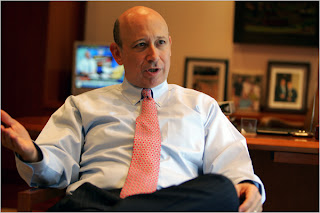Blankfein to Stay at Goldman
Goldman Sachs chairman and chief executive, Lloyd Blankfein has insisted that he has no plans to relinquish any of his current positions. Appearing for the first time on a television interview in two years, he denied any speculation on abdication. Goldman has faced many recent charges for fraud, insider trading, and other scandals in the aftermath of the financial crisis.
On February 24, Goldman Sachs was notified that the charges could include its involvement in the disclosures made as an underwriter of about $1.3 billion of sup-prime mortgages.
This would be the second time that the investment bank faces the SEC for fraud charges. Previously in 2010, the Securities and Exchange Commission filed a lawsuit against Goldman for securities fraud during the financial crisis. The firm was accused of hiring John Paulson, a former executive member and hedge fund manager, to hand select the worst subprime to sell to investors and then bet that they would fail. These bonds were packaged under the name ABACUS 2007-AC1. Paulson and Goldman would then short on these options, secretly betting against their investors. An analogy to this would be if one specifically sold cars with the least reliable brakes and then bought insurance on them. In the end, Goldman paid $550 million in settlements and admitted to omitting disclosures and misleading investors.
However, out of the $12.9 billion worth of bonds Goldman underwrote in 2006, the SEC has not specifically defined which specific bonds the charges relate to. The SEC has been faulted before for failing to clearly identify the exact reason for investigations. With other budge bracket firms also facing charges for similar activities and the upcoming trial of an insider trading case involving Goldman director, the SEC has a lot of cases on its hands. Currently, Goldman is filing an appeal to the SEC in defense of the charges.
In the eyes of investors and the public, the firm immorally and deliberately lied to buyers in what was nothing less than thievery. However, using these short sales, Goldman Sachs managed to cut losses during the recent financial crisis and keep the firm alive. In terms of benefitting the company, the creators of these deals were absolute geniuses who saved their company from potentially sharing the same fate as Bear Sterns and Lehman Brothers during the worst economic crisis since the Great Depression. In this case, the individuals responsible treated their professional duties and the enticement of money with more priority than the well-being of their clients. This brings up the fundamental question of whether or not businesses should focus solely on maximizing profits for shareholders and disregard the common good of society. Although the SEC has tightened its regulations since the crisis, the ineffective discipline of the major contributors to the recession reveal that the banks still have massive leverages over the government. Wealth has become such a driving force in our society that, to many individuals, contractual obligations to companies have more of an influence in our lives than moral obligations.
-Jesse Chai


Comments
Post a Comment